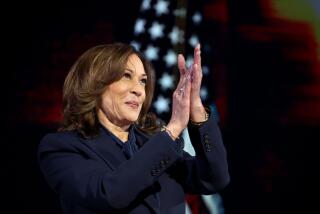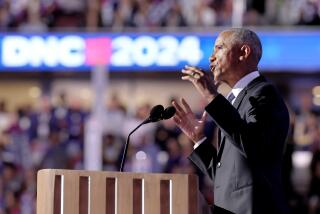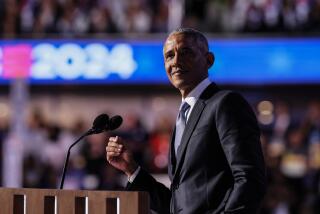Dilemma for congressional Democrats: Campaign with President Obama?
RALEIGH, N.C. -- Before President Obama unveiled a manufacturing initiative here Wednesday, he delivered his customary shout-out to local officials, including the Republican governor sitting in the front row, and thanked Democratic Sen. Kay Hagan “for the great work she’s doing.”
But Hagan wasn’t there to hear his kudos, which Obama noted and which was already well-known by her Republican opponents. The senator, who is facing a tough battle for reelection, had been taking heat for days over whether she would attend, highlighting a quandary vulnerable Democrats will face until election day: how to welcome Air Force One to their state without carrying off its passenger’s baggage.
The dilemma is a familiar one. Both Republicans and Democrats have struggled with how to use -- or carefully hide -- a president while his party fights midterm elections. Sitting presidents are unrivaled fundraisers and reliable base motivators, but can be problematic for campaigns aiming to court independent voters. President George W. Bush, tarnished by the Iraq war, spent the final stretch of the 2006 midterm campaign in Washington or ruby red states.
It’s still too early to know how Democrats like Hagan will handle a president damaged by his botched rollout of the healthcare law. Obama’s approval rating hovers around 40%, slightly lower than Bush’s at this time in his second term.
In announcing Hagan’s decision to stay in Washington, her campaign said the senator had work to do and insisted the choice had nothing to do with the president’s diminished popularity.
But Republican National Committee spokesman Michael Short suggested, “It’s clear Kay Hagan is feeling the heat from rubber-stamping the president’s harmful agenda.” Americans for Prosperity, an outside group that has been targeting Hagan, accused the senator of “hiding” in Washington.
Sadie Weiner, a Hagan campaign spokeswoman, dismissed the charge that she was dodging Obama. “It seems like the fringe, special-interest disdain for middle-class families runs so deep that they don’t understand the simple importance of Kay doing the job she was elected to do in the Senate,” she said.
Hagan has said she would be honored to have the president campaign for her, but has not indicated whether she plans to campaign with him. Asked about the senator’s thinking, Weiner declined to answer directly. “The president is always welcome in North Carolina,” she said.
Like Senate Democrats in tough races in Arkansas, Louisiana and New Hampshire, the Hagan campaign argues that the election in North Carolina will not turn on Obama’s approval rating but on the candidates, the issues and the state’s internal political dynamics.
“This race is not going to be about the president. It’s not going to be about just the Affordable Care Act,” Weiner said. “This race is going to be about North Carolina and who is standing up for families in the state.”
Still, some Democrats concede that’s a goal -- not a certainty. Like presidents before him, Obama’s standing with the electorate will undoubtedly influence some races.
PHOTOS: President Obama’s past
Fourteen months after Obama narrowly lost the state, it’s not difficult to find evidence of Obama’s sunken stature. After months of news about the troubled rollout of the Affordable Care Act, it is easy to find conservative Democrats who bemoan the core of the law -- the individual insurance mandate -- and even easier to find Obama supporters quick to express disbelief that the president bobbled his signature law.
“They bungled it! They bungled it! They snatched defeat from the jaws of victory!” said Erv Portman, owner of an airplane parts manufacturer in Apex, who welcomed Obama to his plant in 2011.
But voter disaffection extends beyond healthcare, as North Carolina’s economy continues to sputter.
“I feel like everyone is basically drowning slowly. We’re all treading water, but we’re going under,” said Cindy Eccles, a 49-year-old teacher’s assistant in Apex. For her family, the Obama era has been marked by layoffs. Eccles said she might vote for Hagan, but was willing to look at a GOP opponent. She voted twice for the president, but has lost faith in his ability to help people like her. “He doesn’t seem to be able to do anything.”
Obama tried to convince voters like Eccles otherwise on Wednesday with a stop in the Research Triangle, a high-tech hub. He vowed to take actions on the economy that bypass the GOP-led House. To prove it, he highlighted his administration’s decision to set up a new public-private institute at North Carolina State University to develop semiconductor technology used in energy-efficient products.
“The challenge of making sure everybody who works hard can get ahead in today’s economy is so important that we can’t wait for Congress to solve it,” Obama said. “Where I can act on my own, without Congress, I’m going to do so.”
Democratic allies approve of the president’s focus. His decision to contrast his economic vision with Mitt Romney’s drove his reelection in 2012. His surest path to regain his footing is to reprise that message -- with a focus on addressing income inequality, aiding middle-class families, expanding job growth, extending long-term unemployment insurance and investing in education, science and technology.
Victory for Democrats here will depend on raising enough money to wage an expensive campaign and generating high turnout in urban areas with large numbers of young voters and African Americans. Obama has shown that he is skilled at both.
Ultimately, Hagan will campaign with Obama, if only to put to rest charges that she is avoiding the president, said Gary Pearce, a longtime North Carolina political operative.
Follow Politics Now on Twitter and Facebook
kathleen.hennessey@latimes.com
Twitter: @khennessey
More to Read
Sign up for Essential California
The most important California stories and recommendations in your inbox every morning.
You may occasionally receive promotional content from the Los Angeles Times.











